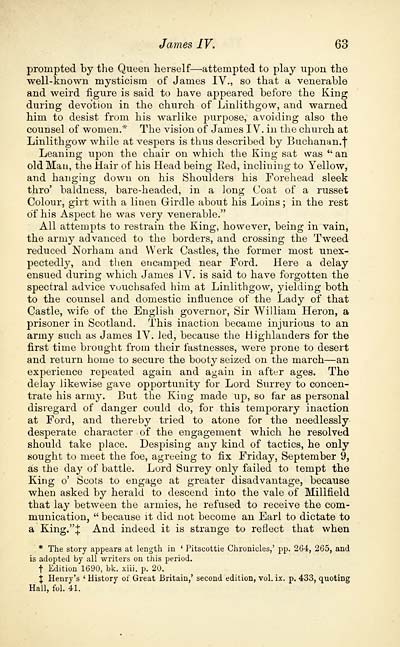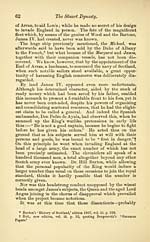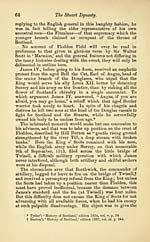Stuart dynasty
(83) Page 63
Download files
Complete book:
Individual page:
Thumbnail gallery: Grid view | List view

James IV. 63
prompted by the Queen herself — attempted to play upon the
well-known mysticism of James IV., so that a venerable
and weird figure is said to have appeared before the King
during devotion in the church of Linlithgow, and warned
him to desist from his warlike purpose, avoiding also the
counsel of women.* The vision of James IV. in the church at
Linlithgow while at vespers is thus described by Buchanan. f
Leaning upon the chair on which the King sat was " an
old Man, the Hair of his Head being Red, inclining to Yellow,
and hanging down on his Shoulders his Forehead sleek
thro' baldness, bare-headed, in a long Coat of a russet
Colour, girt with a linen Girdle about his Loins; in the rest
of his Aspect he was very venerable."
All attempts to restrain the King, however, being in vain,
the army advanced to the borders, and crossing the Tweed
reduced Norham and Werk Castles, the former most unex-
pectedly, and then encamped near Ford. Here a delay
ensued during which James IV. is said to have forgotten the
spectral advice vouchsafed him at Linlithgow, yielding both
to the counsel and domestic influence of the Lady of that
Castle, wife of the English governor, Sir William Heron, a
prisoner in Scotland. This inaction became injurious to an
army such as James IV. led, because the Highlanders for the
first time brought from their fastnesses, were prone to desert
and return home to secure the booty seized on the march — an
experience repeated again and again in after ages. The
delay likewise gave opportunity for Lord Surrey to concen-
trate his army. But the King made up, so far as personal
disregard of danger could do, for this temporary inaction
at Ford, and thereby tried to atone for the needlessly
desperate character of the engagement which he resolved
should take place. Despising any kind of tactics, he only
sought to meet the foe, agreeing to fix Friday, September 9,
as the day of battle. Lord Surrey only failed to tempt the
King o' Scots to engage at greater disadvantage, because
when asked by herald to descend into the vale of Millfield
that lay between the armies, he refused to receive the com-
munication, " because it did not become an Earl to dictate to
a King.":}; And indeed it is strange to reflect that when
* The story appears at length in ' Pitscottie Chronicles,' pp. 264, 265, and
is adopted by all writers on this period.
t Edition 1690, bk. xiii. p. 20.
% Henry's ' History of Great Britain,' second edition, vol. ix. p. 433, quoting
Hall, fol. 41.
prompted by the Queen herself — attempted to play upon the
well-known mysticism of James IV., so that a venerable
and weird figure is said to have appeared before the King
during devotion in the church of Linlithgow, and warned
him to desist from his warlike purpose, avoiding also the
counsel of women.* The vision of James IV. in the church at
Linlithgow while at vespers is thus described by Buchanan. f
Leaning upon the chair on which the King sat was " an
old Man, the Hair of his Head being Red, inclining to Yellow,
and hanging down on his Shoulders his Forehead sleek
thro' baldness, bare-headed, in a long Coat of a russet
Colour, girt with a linen Girdle about his Loins; in the rest
of his Aspect he was very venerable."
All attempts to restrain the King, however, being in vain,
the army advanced to the borders, and crossing the Tweed
reduced Norham and Werk Castles, the former most unex-
pectedly, and then encamped near Ford. Here a delay
ensued during which James IV. is said to have forgotten the
spectral advice vouchsafed him at Linlithgow, yielding both
to the counsel and domestic influence of the Lady of that
Castle, wife of the English governor, Sir William Heron, a
prisoner in Scotland. This inaction became injurious to an
army such as James IV. led, because the Highlanders for the
first time brought from their fastnesses, were prone to desert
and return home to secure the booty seized on the march — an
experience repeated again and again in after ages. The
delay likewise gave opportunity for Lord Surrey to concen-
trate his army. But the King made up, so far as personal
disregard of danger could do, for this temporary inaction
at Ford, and thereby tried to atone for the needlessly
desperate character of the engagement which he resolved
should take place. Despising any kind of tactics, he only
sought to meet the foe, agreeing to fix Friday, September 9,
as the day of battle. Lord Surrey only failed to tempt the
King o' Scots to engage at greater disadvantage, because
when asked by herald to descend into the vale of Millfield
that lay between the armies, he refused to receive the com-
munication, " because it did not become an Earl to dictate to
a King.":}; And indeed it is strange to reflect that when
* The story appears at length in ' Pitscottie Chronicles,' pp. 264, 265, and
is adopted by all writers on this period.
t Edition 1690, bk. xiii. p. 20.
% Henry's ' History of Great Britain,' second edition, vol. ix. p. 433, quoting
Hall, fol. 41.
Set display mode to:
![]() Universal Viewer |
Universal Viewer | ![]() Mirador |
Large image | Transcription
Mirador |
Large image | Transcription
Images and transcriptions on this page, including medium image downloads, may be used under the Creative Commons Attribution 4.0 International Licence unless otherwise stated. ![]()
| Histories of Scottish families > Stuart dynasty > (83) Page 63 |
|---|
| Permanent URL | https://digital.nls.uk/94818762 |
|---|
| Description | A selection of almost 400 printed items relating to the history of Scottish families, mostly dating from the 19th and early 20th centuries. Includes memoirs, genealogies and clan histories, with a few produced by emigrant families. The earliest family history goes back to AD 916. |
|---|

